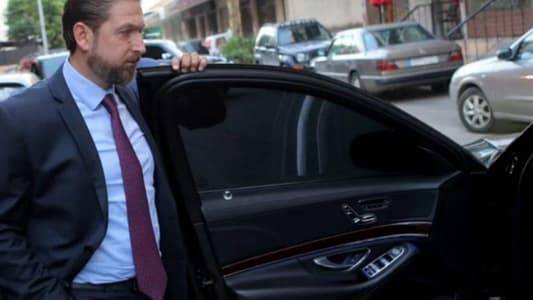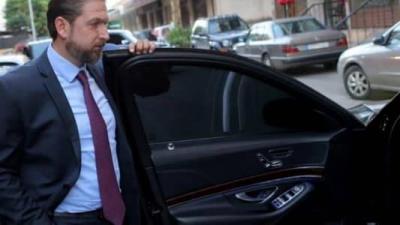It is not a detail to mention what the Speaker of Parliament, Nabih Berri, stated when he welcomed MP Faisal Karamé back to the Parliament: "You have restored balance to the political life in Lebanon". It is also not a minor detail that he received several invitations, including meetings in Beirut where the Secretary-General of the "Future Movement", Ahmad Hariri, participated. Unlike previous occasions, Karamé's parliamentary return is a pivotal moment politically for several reasons. Perhaps it is the thirst on the Sunni scene that has made many from his political team take a breather and count on him, or it is the current obstructive composition of Parliament that has allowed Sunnis to breathe easier with his return.
It can be said that the Constitutional Council's decision to restore Karamé's parliamentary seat has reintroduced several considerations that will have an impact on Lebanese political life in the upcoming phase. With his return, the Constitutional Council has opened doors in political life that will gradually emerge, especially during this presidential vacuum phase and the preparations for electing a President of the Republic. From a political perspective that experienced the history of the late President Omar Karamé, the most significant return with the arrival of Karamé the son—considered lost since the elections—is the Sunni political reference in Parliament. His return to Parliament may mark the end of a phase of frustration and void in leadership.
Given the current reality, Karamé may find opportunities to attract several MPs around him, having received congratulations upon his return and heard supportive words and readiness for collaboration from several MPs. The facts reveal that Karamé has indeed begun communicating with several MPs to form a parliamentary bloc that may include up to six members from Tripoli and beyond. The existence of such a bloc would shift the balances in Parliament and fill the gap that new Sunni MPs have failed to address.
While the presidential issue appears closed from the Christian side, the next dilemma after electing a president will surely revolve around electing a Prime Minister. This is the third dimension of Karamé's parliamentary return, according to a knowledgeable politician who observes: "Karamé’s presence within a parliamentary bloc indicates his readiness for any upcoming entitlement, making it difficult to bypass him in Sunni matters. He may manage to assert himself in the coming days, especially if he succeeds in gaining international and regional recognition and if Saudi Arabia finds its solution in him."
Since his return to parliamentary duties, Karamé has begun contacting MPs to discuss the establishment of a comprehensive parliamentary bloc, receiving positive responses from a number of representatives who share similar principles. In an interview with "Nidaa Al-Watan," Karamé stated, "It was natural for me to consult immediately upon my return to Parliament with my colleagues MPs, Jihad al-Samad and Taha Naji, with whom I ran in the elections on a joint list. We exchanged ideas about what we could accomplish together. Al-Samad opposed the idea of reviving the 'Consultative Meeting,' which he deemed unsuccessful, while I considered it a venture with its pros and cons. My personal desire is to form a national front that is beyond regional and political alignments and not limited to Tripoli only, broader than just a parliamentary meeting or bloc. I consulted on this with the Projects Association, whose MPs will stand with me, and with MP Hassan Murad as well as representatives of the "Uprising" list, MP Haidar Nasser, and others. The matter is still in the consultation phase but will take its final shape next week."
He continued, "I am not personally ambitious; rather, I aim for a country where our children can live in peace, and this cannot be achieved through provocative rhetoric." He pointed out that starting from his position, "As a national figure, I do not confine my thoughts to my region or sect. I am not on a political trajectory limited to Tripoli. Our future ambition is a national gathering or a parliamentary bloc that represents a new face in parliamentary political life." His goals include "regaining order for institutional work, electing a president recognized for their competence and clean hands, and forming a government capable of addressing the current economic crisis, if not resolving it."
The hidden point lies in the election of the President of the Republic. The Parliament is divided among blocs with divergent views on electing a president and their work programs, making it impossible for them to agree on a consensual candidate or secure a parliamentary majority necessary to elect a president. This necessitates a parliamentary bloc that restores balance in parliamentary work and can serve as a pivotal force when needed. This is a goal Karamé may achieve if his communications succeed in securing a sufficient number of MPs to form the desired front, which he does not want to be restricted to Tripoli or the Sunni identity specifically. He belongs to Tripoli and aims to reach out to all its components: "I am open to all, and I hope to form a point of convergence. I have opened channels of dialogue with MPs from Akkar, Sidon, the Beqaa, Beirut, and the atmosphere is positive," while he does not forget to stress that "another essential goal is to fill the void on the Sunni scene."




